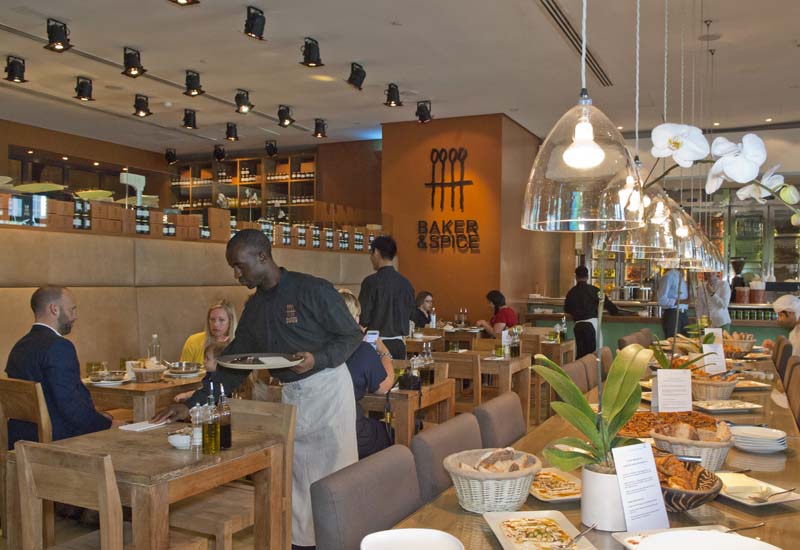 Top row (L-R): chef Manish Gajra and head chef Sumantha Roy. Bottom row (L-R): sous chef Sandesh Bodke, Andre Gerschel, and pastry chef Aaliyah Randeree.
Top row (L-R): chef Manish Gajra and head chef Sumantha Roy. Bottom row (L-R): sous chef Sandesh Bodke, Andre Gerschel, and pastry chef Aaliyah Randeree.
Asked more about this committment to working with local farmers, he tells Caterer candidly: “It has nothing necessarily to do with ethics; it’s actually about quality. When things travel a shorter distance to reach us, they’re better and they taste better. For us, that’s what it’s all about. It needs to taste better first and foremost, and then if it fits the ethical standards that we hope it does — fantastic. And then if it fits the cost structure our customers want, we really have a full service offer.
“I do think it’s important [to serve organic food] but at the end of the day, it’s a better product. A cow that’s been treated better, tastes better — it just does and if it didn’t, we would probably have different practices.”
In terms of whether he has noticed an increasing trend for consumers to be concerned about ethical standards when they’re dining out, he remarks: “I think there’s a danger in being trendy. I think it’s really important to understand what a label is and what it means, what it intends and what it wants to say.
"The word ‘organic’ has been massively misappropriated. To understand what organic is, you have to go and physically visit your suppliers. That’s an intensive process to adopt for a local operator running out of Dubai but you can taste the difference — people who come here repeatedly don’t know why our food tastes different. There’s nothing different about the specific ingredients; if anything we show a wonderful restraint. We don’t put 16 ingredients on a 60,000 dirham gold plated plate and hide it behind a European chef’s name, for example. While there is a market for that, what we’re serving is very simple food.”
Coming back to what labels mean and why embracing the philosophy behind a word is all-important, Gerschel tells Caterer: “I love arguing about food with people and the minute you say the words ‘organic’ and ‘ethically sourced’, it’s going to provoke debate, which we love to have, and it challenges us to be more on our toes.”
With thoughts turning to the other ways in which Baker & Spice stands out from its peers, Gerschel says that the brand successfully manages to retain its staff for years at a time, which is surprising not only in a transient city like Dubai, but in the hospitality industry in general.
Asked why he thinks the company has been able to do this, he says that while he realises that his staff could be earning more money at other places — and never shies away from making sure that they know this — people “learn a tonne” by working with Baker & Spice and he thinks there’s a real sense of camaraderie among the team.
“The most important thing you can do in any sort of pastoral role is be attentive. You can make a lot of mistakes that are covered by attentiveness — just show up and show that you care, even when it’s inconvenient.
"Ultimately I want to give staff a place where they can learn and I want to continue this idea of having a teaching kitchen, and then there is no limit to how long somebody would want to stay.”
Continuing, he reveals that the team works a five-day week and takes part in engagement programmes.
He explains: “So, if somebody wants to take a class, and they’ve been here for more than a year, I pay for it fully — whatever it is. If one of my chefs want to learn about wine, or a waiter wants to learn about restaurant finance, or a maître d wants to learn Arabic, they can.
“We also have an amazing innovation programme in place that I love: if you work in the kitchen, you have to figure out a way to make someone in the front-of-house’s life easier. So, you come up with a life hack and present it at the end of the month and, if you win, you get a generous voucher from a store or a day off, or something extra. And it can be something simple that wins — we were throwing out banana peels and one of the guys in the kitchen recommend that we use them to shine shoes front-of-house.
"Often our staff are coming from places where they use what they have [to hand] and that’s something we have always been big fans of.”
Similarly, Baker & Spice sticks faithfully to the philosophy of ‘reduce, reuse, recycle’, using empty water bottles as containers for pomegranate molasses or olive oil, before eventually sending them to a glass melting factory in Ras Al Khaimah to become the jam jars that you’ll notice house the bill that arrives at the end of your meal.

| Advertisement |









 Search our database of more than 2,700 industry companies
Search our database of more than 2,700 industry companies









